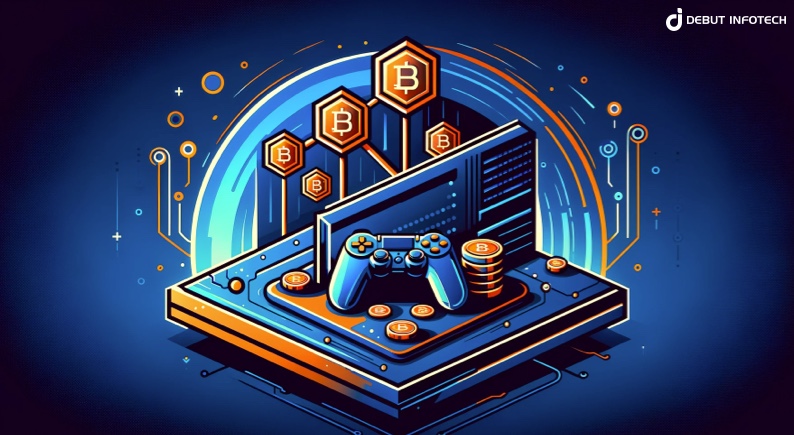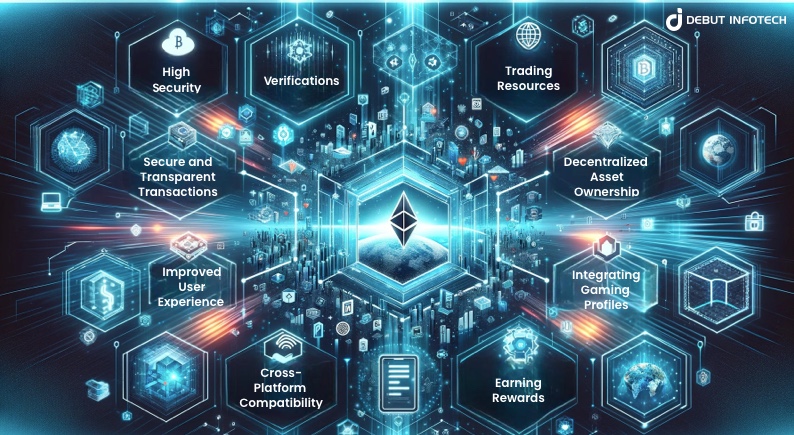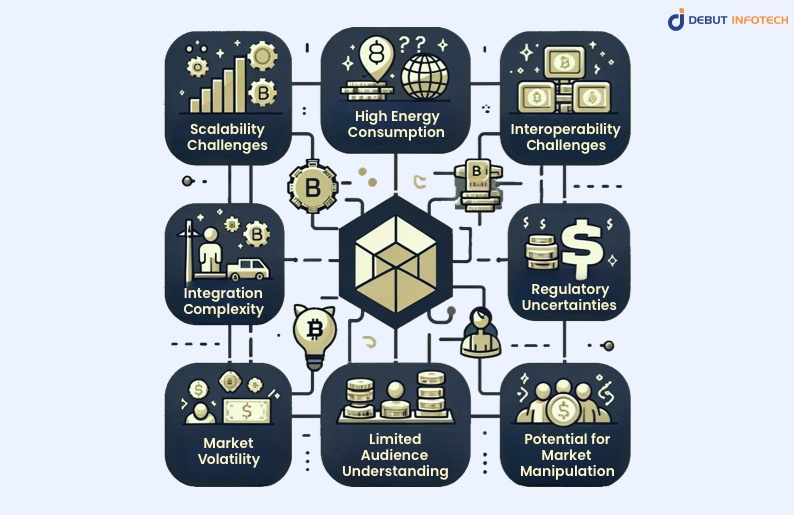Table of Contents
Home / Blog / Blockchain
How Blockchain in Gaming is Shaping the Future of Digital Ownership
January 3, 2024

January 3, 2024
Blockchain gaming is revolutionizing the gaming industry by adding additional security and decentralization features. A report released by Dappradar shows an astounding 2000% surge since 2021’s first quarter; an astounding 1.5 million gamers globally are participating. Technologies like Web3, Metaverse, and NFTs play an essential role in blockchain gaming; giving players ownership over in-game items through play-to-earn models like NFTs. But while blockchain game development services may offer numerous advantages, its practitioners still face several barriers; let us examine this phenomenon more deeply to truly grasp its essence and uncover all its possibilities!
Gaming investors and gamers are captivated by the possibility of using blockchain to add real-world value to in-game items, giving gamers the ability to purchase items within games and then sell them later for real cash! Blockchain game developers appreciate the technology’s capacity for long-lasting platforms to which other creators can add content. While such ideas might sound exciting, keep in mind that this new industry still presents unique challenges.
This article will walk you through all you need to know about blockchain in gaming, from its basic definition and usage within gaming – to more in-depth topics such as real-world examples of blockchain game development solutions.
Role Of Blockchain In Gaming: Overview

Blockchain technology provides a decentralized digital ledger that operates without central authority to ensure safe and recorded transactions. Blockchain has revolutionized gaming for both companies and players by offering Non-Fungible Tokens (NFTs) and cryptocurrencies as the basis of purchases of in-game assets that can then be traded back for real currency – giving players new experiences!
Let’s see how Blockchain can be applied in gaming:
True Ownership of Digital Assets: Blockchain gaming allows gamers to truly own the items in-game. Unlike traditional games where digital assets remain locked within the game world, blockchain gaming enables gamers to trade or sell them outside the game environment for real tangible values.
Enhanced Authenticity and Security: Blockchain’s inherent security features ensure in-game transactions, asset ownership and other aspects of gameplay remain safe and unalterable, creating an authentic gaming experience enhanced by blockchain’s trust-building features.
Decentralized Gaming Economy: Blockchain has introduced a decentralized economy into gaming where players can earn and spend real money within and across various games – this could transform gaming from simply a hobby into a source of income.
Facilitating Cross-Game Compatibility: Assets from one game could be used in another, creating an interconnected gaming world and lengthening and increasing the utility of in-game purchases.
Impact on Esports: With blockchain’s transparent and immutable records of scores and achievements in esports, fair play can be ensured while trust between gamers is built up.
Empowering Players in Game Development: Blockchain’s player-centric approach enables gamers to have input on game updates or changes through decentralized governance.
Expanding Market Opportunities: The blockchain gaming market is expanding quickly, opening up many doors for investors, developers, and players. This success speaks to its rising acceptance and enthusiasm from players worldwide.
Related Read: What is Blockchain as a Service & its Business Benefits?
What Are the Transformative Impacts of Blockchain Technology on the Gaming Industry?
Blockchain technology, though not entirely novel, has recently seen an astounding upsurge in its application to the gaming industry. The implementation of Blockchain in gaming can be considered a game-changer with numerous benefits that are revolutionizing how games are developed, played, and valued.

Here’s an in-depth exploration of how blockchain is revolutionizing the gaming industry:
Secure and Transparent Transactions: One of the biggest advantages of blockchain in gaming is its security and transparency in transactions. Due to its immutable nature, blockchain ensures no double spending or fraud occurs during transaction records – this is especially beneficial when games use sensitive data or virtual assets like Non-Fungible Tokens (NFTs). Players can engage in digital transactions knowing their activities are secure and transparent.
You May Like To Read: How Blockchain Enhances Data Privacy and Security in Businesses?
Improved User Experience: Utilizing blockchain, games can offer players a more efficient, secure, and transparent means to engage in digital transactions and gain access to virtual assets. They give players greater control of their gaming experience–from personalizing characters and storylines to downloading multiple versions from multiple locations without compromising game quality.
Verifications: Blockchain gaming platforms ensure all transactions and interactions are legitimate and verifiable, helping combat one of the primary concerns among modern-day gaming platforms – fraud. Furthermore, their record-keeping feature guarantees no individual or party is paid twice for similar services or goods provided; every transaction is uniquely recorded.
Trading Resources: Blockchain gaming allows players to trade items for profits or resources with confidence thanks to the blockchain’s record of ownership of each item, as it prevents theft or duplication during transactions. Furthermore, players can buy and sell in-game assets between themselves adding an economic element to the gaming experience.
High Security: Blockchain technology enhances game security through advanced encryption systems like Secure Messaging and Two-Factor Authentication, offering extra protection for player information, game data, and transactions – making it extremely hard for them to be altered or compromised in any way.
Earning Rewards: In blockchain-based games, players can collect rewards in the form of cryptocurrency by completing quests and missions – this represents a radical departure from traditional gaming where rewards were typically non-monetizable points. Cryptocurrencies earned in blockchain games hold real-world value, allowing players to spend them purchasing items within the game itself or online marketplaces like eBay.
Integrating Gaming Profiles: With blockchain games’ advent comes an opportunity to form a centralized gaming community. Players can utilize one profile across multiple gaming platforms for optimal user experience and simplified acquisition of in-game items.
Recommended for You: Developing Your Own Secure Private Blockchain: A Step-by-Step Guide
Limitations Of Blockchain Technology in the Gaming Industry
While blockchain technology has brought significant innovations to the gaming industry, it’s important to recognize its limitations and challenges. These limitations can impact game development, player experience, and the broader adoption of blockchain in gaming.

- Scalability Issues: One of the primary limitations of blockchain technology in gaming is scalability. Many blockchain networks, particularly those that are more popular for gaming applications, struggle with handling large volumes of transactions quickly and efficiently. This can lead to slower game performance and higher transaction fees, detracting from the player experience.
- Complexity and User Experience: Blockchain technology can be complex for the average user. Integrating blockchain into games often requires a higher level of technical understanding from players, particularly when dealing with cryptocurrency transactions or managing digital wallets. This complexity can be a barrier to entry for new players who are not familiar with blockchain.
- Energy Consumption and Environmental Concerns: Certain blockchain networks, especially those that rely on proof-of-work (PoW) consensus mechanisms. This raises environmental concerns, especially in an era where sustainability is becoming increasingly important. The carbon footprint associated with these blockchain networks can be a significant drawback.
- Regulatory Uncertainty: The use of blockchain and cryptocurrencies in gaming also introduces regulatory challenges. Different countries have varying regulations regarding the use of cryptocurrencies and blockchain technology. This legal uncertainty can hinder the development and global rollout of blockchain-based games.
- Integration with Traditional Gaming Models: Blockchain integration with existing gaming models and platforms can be challenging. There is often a need for substantial redevelopment to incorporate blockchain, and not all gaming companies may be willing or able to make this investment.
- Market Volatility: The value of cryptocurrencies and digital assets used in blockchain games can be highly volatile. This volatility can affect the in-game economy and the real-world value of the assets players earn or purchase in the game.
- Security Concerns: While blockchain is generally secure, the gaming industry has witnessed instances where blockchain games have been targeted by hackers. Smart contract vulnerabilities and security lapses can lead to significant losses for players and developers.
Uncover More on Enterprise Blockchain: Fostering Business Innovation
Real-World Use-Cases Of Blockchain In Gaming
Blockchain technology has introduced several real-world applications in the gaming industry, fundamentally changing how games are developed, played, and valued. Here are key use cases illustrating the impact of blockchain in gaming:
Digital Asset Ownership and Trading: Blockchain enables true ownership of in-game assets. Players can buy, sell, or trade these assets as they would with physical goods. For example, in games like ‘CryptoKitties’, players can collect, breed, and trade digital cats as unique assets. This feature has created a new market for digital collectibles within gaming.
Play-to-Earn Models: Blockchain games like ‘Axie Infinity’ have popularized the play-to-earn model, where players can earn cryptocurrency by participating in the game. This approach not only enhances player engagement but also allows gamers to earn real-world income through their in-game activities.
Enhanced Security and Verification: Blockchain’s inherent security features ensure the authenticity and security of in-game transactions. Games such as ‘The Sandbox’ use blockchain to authenticate item ownership, reducing the risk of fraud and ensuring fair play.
Cross-Game Compatibility: Blockchain enables interoperability between different games. Players can potentially use assets from one game in another, enhancing the value and utility of their in-game purchases. This creates an interconnected ecosystem of games, increasing player retention and engagement.
Decentralized Autonomous Organizations (DAOs) in Gaming: Some blockchain games explore the use of DAOs, where players have a say in the game’s development and governance. This player-centric approach fosters a more engaged and active community.
Tokenization and In-Game Economies: Blockchain allows for the creation of in-game currencies or tokens that can have real-world value. This tokenization transforms in-game economies, providing players with tangible rewards that extend beyond the digital world.
Conclusion
Blockchain technology has quickly become an integral component of gaming industry innovation, providing real-time data access and strong security features suited for managing financial records. Furthermore, adopting web3 gaming using this blockchain-based solution places brands at the forefront of innovation while further improving player experiences.
It is highly essential to choose the right blockchain development company to deliver the project on time and with the desired quality. Debut Infotech offers innovative blockchain development services designed to expand gaming businesses. Our team boasts extensive expertise and knowledge of this technology, giving us an edge in helping create captivating blockchain games that captivate players.
Contact us now to discover more about our offerings and learn how we can assist in developing blockchain games tailored specifically for your enterprise!
FAQs
Q: How is blockchain technology impacting the gaming industry?
A: Blockchain technology is revolutionizing the gaming industry by introducing secure and transparent transaction methods. It allows for true digital ownership, meaning players can actually own, trade, and make money from their in-game assets. This technology is changing the way games are played and monetized, creating innovative economic models within the gaming world.
Q: How much does blockchain game development cost?
A: The blockchain app development cost for gaming varies widely based on its complexity and features. Simple games may cost a few thousand dollars, while more elaborate projects can run into hundreds of thousands. The scale and intricacy of the game are the main factors that influence the overall cost.
Q: What are the key considerations when developing a blockchain-based game?
A: When developing a blockchain-based game, important factors to consider include selecting the appropriate blockchain platform, designing a game economy that is both engaging and balanced, ensuring the game can scale and maintain security, and complying with legal and regulatory standards. These elements are crucial for the successful implementation of blockchain in gaming.
Q: What are the benefits of blockchain gaming for my business?
A: Blockchain gaming offers several benefits for enterprises, such as creating new revenue streams through digital asset trading. It also increases player engagement by providing them with true ownership of in-game assets. Furthermore, adopting blockchain in gaming can give businesses a competitive advantage in a market that is rapidly expanding.
Q: How is blockchain technology impacting esports?
A: In the esports industry, blockchain technology is enhancing the management of competitive gaming. It provides transparent and secure systems for managing player rankings, rewards, and transactions. This technology boosts the integrity and reliability of esports, making it more trustworthy and fair for all participants.
Talk With Our Expert
Our Latest Insights
USA
2102 Linden LN, Palatine, IL 60067
+1-703-537-5009
[email protected]
UK
Debut Infotech Pvt Ltd
7 Pound Close, Yarnton, Oxfordshire, OX51QG
+44-770-304-0079
[email protected]
Canada
Debut Infotech Pvt Ltd
326 Parkvale Drive, Kitchener, ON N2R1Y7
+1-703-537-5009
[email protected]
INDIA
Debut Infotech Pvt Ltd
C-204, Ground floor, Industrial Area Phase 8B, Mohali, PB 160055
9888402396
[email protected]




Leave a Comment